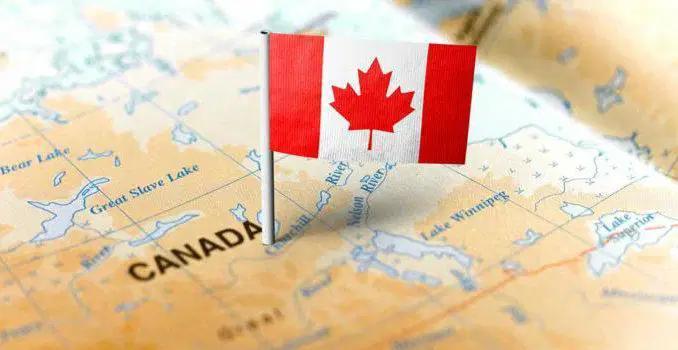Headline
Canada Denies 13,000 Nigerians Asylum

No fewer than 13,171 Nigerians who applied for refugee protection from January 2013 to December 2024 were turned down by Canadian government, Sunday PUNCH reports.
This includes 811 Nigerians rejected in 2024.
Official data from the Refugee Protection Division of the Immigration and Refugee Board of Canada placed Nigeria among the top five countries with the most rejected claims. It ranked 5th.
Others are Mexico with 2,954 rejections, India (1,688), Haiti (982) and Colombia (723).
The IMRB grants refugee protection in Canada if the RPD satisfactorily confirms that an applicant or claimant meets the United Nations definition of a Convention refugee, “which has been incorporated into Canadian law, or that the applicant is a person in need of protection.”
The 1951 UN Convention relating to the Status of Refugees defines refugees as persons who have a substantiated fear of persecution because of their race, nationality, religion, political ideology or membership in a particular social group.
Such social groups can include sexual orientation, gender identity, being a woman and persons living with HIV/AIDS.
However, persons asking for protection in Canada must show evidence portending danger of torture, risk to their life or risk of cruel and unusual treatment or punishment should they return to their country of nationality.
Typically, such protection claims are made when immigrants notify the Border Services Agency at any port of entry upon arriving in Canada or report to an immigration officer.
“The officer decides whether the claim is eligible to be referred to the IRB.
READ ALSO: Canada Gets New Prime Minister
“If the claim is eligible, it is sent (“referred”) to the RPD to start the claim for refugee protection process,” an application guideline by the Refugee Board reads.
Within the timeframe reviewed, 94 claims from Nigerian passport holders were abandoned. The RPD says a claim may be abandoned if “the completed Basis of Claim Form was not provided on time, the claimant’s current and correct contact information was not provided, or the claimant did not attend their refugee protection claim hearing or the special hearing on the abandonment of the claim (if required).”
Seventy-eight claims were withdrawn, representing cases where “the claimant does not continue with their claim,” the RPD said, while 19,889 claims were still pending.
The breakdown of the rejections since 2013 showed that 127, 241 and 248 Nigerians were denied protection in 2013, 2014 and 2015, respectively, under the new system for determining refugee protection claims made in Canada—which took effect on December 15, 2012.
476, 917 and 1,777 claims were rejected in 2016, 2017 and 2018 respectively.
2019 saw the highest number of rejected claims, with 3,951 Nigerian applicants turned down. Meanwhile, 1,770, 1,686, 728, 439 and 811 persons were denied protection in 2020, 2021, 2022, 2023 and 2024, respectively.
Nevertheless, 10,580 Nigerians were granted refugee status within the decade under review, with at least 2,230 from January to December 2024.
Official data placed Nigeria among the top 10 countries with the most claims accepted. It ranked 8th on the list.
Others are Turkiye with 4,866, Mexico with 4,363, Colombia with 3,340, Iran with 3,200, Pakistan with 2,556, Haiti with 2,211, Afghanistan with 1,921 and Kenya with 1,653 claims accepted.
READ ALSO: Canada Set To Accept 14,000 Construction Workers In 2025
They include less than 20 in 2013, 308, 394 and 389 in 2014 and 2015, respectively. 389, 764, 755 and 1,733 Nigerian protection seekers were accepted in 2016, 2017, 2018 and 2019, respectively. In 2020, 2021 and 2022, 1,534, 2,302, and 1,315 persons were granted protection, respectively.
Imaobong Ladipo-Sanusi is the Executive Director of the Women Trafficking and Child Labour Eradication Foundation.
She told our correspondent that irregular migration motivated by economic hardship is often the leading cause of rejections.
However, she said those who genuinely need protection should be accepted whether or not they migrate outside the regulatory norms of their receiving country.
“Most times, many Nigerians miss it when they don’t understand the laws governing refugee status as adopted in their chosen destination. Every country has its regulations for absorbing people into its system.
“For one, documentation is crucial because coming irregularly will get you rejected from their system. But ultimately, everybody’s rights must be protected. Migration must be safe, orderly and regular. Even if their status is irregular, those who really need protection should be protected,” Ladipo-Sanusi told The PUNCH.
Meanwhile, a development economist, Aliyu Ilias, argued that the exit of more Nigerians and their permanent settlement in Canada means less skilled labour for the country.
According to Ilias, the country is running at a loss, given the subsidised education some professionals receive from Nigerians and deploy their skills elsewhere.
“It’s definitely a cause of concern because our professionals are moving, and it takes a whole lot to train these professionals. In the medical sector, Nigeria subsidises a lot to get people trained.
READ ALSO: Visa Rejection Rates Hits High In Canada As 2.36 Million Applications Denied
“You cannot get trained as a medical doctor or an engineer abroad for a cheaper cost compared to what we get in Nigeria. So, it is a total brain drain in the long run and for the economy, it is reducing our GDP.
“The appalling part is that most of our Nigerian brothers and sisters who go out do not return. They get permanent residency, and they become valuable to the immediate country,” he explained.
Citing reports revealing that Nigerians in the Diaspora remitted an average of $20bn annually from 2019 to 2021, Ilias said, “Perhaps, the only hope is that these Nigerians send back some of their incomes home.”
However, the Convener of the civil society group, Concerned Nigerians, Deji Adeyanju, said the country could not thrive long-term on tokenism.
He argued that the monies received as remittances were no match for the economic contributions the fleeing Nigerians would have made if they remained in the country.
“So, can we develop our economy with tokenism? How can professionals migrating from a country be a good thing?” Adeyanju queried.
He added, “The health sector is struggling. When your best brains leave your country and go to build other economies all around the world, how can that be good for any nation?
“Innovators, scientists, doctors, surgeons, even lawyers are leaving the country. Look at how our doctors and university lecturers are being treated. Why should any professional stay behind? This has become what we call the Japa syndrome.”
Headline
U.S. Lawmaker Reacts To Nigeria, U.S. Airstrikes

United States Congressman, Riley Moore, has stated that President Donald Trump is determined to put an end to the killing of Christians in Nigeria, warning that further action may follow if the violence persists.
Moore made the statement on Friday via his official X handle.
According to the lawmaker, the strike represents the first step in addressing what he described as the ongoing slaughter of Christians and the broader security crisis affecting Nigerians across religious and ethnic lines.
READ ALSO:US Dept Of War Shares Video Of Air Strikes In Nigeria
“President Trump has been clear that the killing of Christians in Nigeria must end,” he said.
He that the administration’s resolve on the matter should not be underestimated.
“As I stated at the outset: Do not test President Trump‘s resolved in this matter.
READ ALSO:JUST IN: US Forces Bomb Terrorists Camps In Nigeria
“Tonight’s strike in coordination with the Nigerian government is just the first step to ending the slaughter of Christians and the security crisis affecting all Nigerians,” he said.
He stressed that the operation signals a stronger stance by the United States in support of Nigeria’s efforts to tackle terrorism and violent extremism, noting that further measures could be taken if the situation does not improve.
Headline
US Dept Of War Shares Video Of Air Strikes In Nigeria

A video footage of the US military air strikes in Nigeria has emerged.
The video was released by the US Department of War following its air strikes against terrorists in Sokoto.
Earlier, the US secretary of War, Pete Hegseth had confirmed that military air strikes hit terrorists in Nigerians, saying it was deadly.
Later on, the US. African Command, confirmed that it conducted the attacks described as very deadly by President Donald Trump.
Trump said he was only keeping the promise he made earlier last month to strike the terrorists he believes are killing innocent Christians.
READ ALSO:JUST IN: US Forces Bomb Terrorists Camps In Nigeria
Although described as powerful and deadly, the casualty caused by the attack is yet to be released.
Explaining further, security expert, Brant Philip, said the strikes may have been launched “from the USS Paul Ignatius, using a Tomahawk missile.”
The Nigerian government through its ministry of foreign affairs has also confirmed that the strikes were successful.
Watch video here
Headline
JUST IN: US Forces Bomb Terrorists Camps In Nigeria

United States President Donald Trump said US forces conducted deadly strikes against Islamic State terrorists in northwestern Nigeria, and vowed more attacks if the militants keep killing Christians.
“I have previously warned these Terrorists that if they did not stop the slaughtering of Christians, there would be hell to pay, and tonight, there was,” Trump posted on his Truth Social platform, adding that “the Department of War executed numerous perfect strikes.”
READ ALSO:JUST IN: Kano Lawmaker, Sarki Aliyu Daneji, Dies Hours After Colleague’s Passing
Trump stated that the Department of War “executed numerous perfect strikes, as only the United States is capable of doing. Under my leadership, our Country will not allow Radical Islamic Terrorism to prosper.”
The US president wished everyone Merry Christmas, “including the dead Terrorists, of which there will be many more if their slaughter of Christians continues.”
Details later.

 News4 days ago
News4 days agoPHOTOS: New Era In Furupagha-Ebijaw As Okpururu 1 Receives Staff Of Office

 News3 days ago
News3 days agoUBTH CMD Marks 120 Days In Office, Expresses Commitment To Providing Conducive Working Environment

 News4 days ago
News4 days agoOPINION: Gumi And His Terrorists

 News3 days ago
News3 days agoFIRS Confirms NIN As Tax ID

 News4 days ago
News4 days agoFG Declares Public Holidays For Christmas, New Year Celebrations

 Metro3 days ago
Metro3 days agoFintiri Pardons Man Sentenced To Death For ‘Killing Herdsman In Self-defence’, Others

 News4 days ago
News4 days agoOPINION: Christmas And A Motherless Child

 News2 days ago
News2 days agoJUST IN: Kano Lawmaker, Sarki Aliyu Daneji, Dies Hours After Colleague’s Passing

 News4 days ago
News4 days agoOPINION: My Man Of The Season

 News4 days ago
News4 days agoKWAM 1 Withdraws From Awujale Race, Ends Court Challenge






























